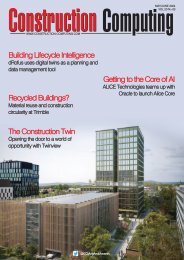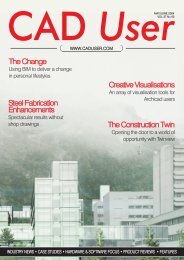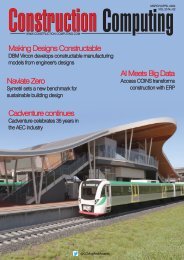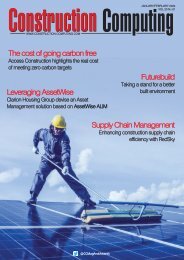You also want an ePaper? Increase the reach of your titles
YUMPU automatically turns print PDFs into web optimized ePapers that Google loves.
INDUSTRYfocus<br />
Jobs for the old boys?<br />
Where is the next generation of skilled construction professionals going to come from? The<br />
Access Group has some suggestions<br />
The Construction Industry Training<br />
Board (CITB) announced a couple<br />
of years ago that we are short of<br />
about a quarter of a million construction<br />
workers in the industry. Figures from<br />
YouGov from about the same time said<br />
that a mere 3% of youngsters between<br />
the ages of 18 and 24 are looking to the<br />
construction industry as a profession.<br />
And at the Office of National Statistics<br />
(ONS) they say that 20% of the<br />
construction workforce are over the age<br />
of 50, and that figure rises to 58% when<br />
you add in the 29-45 age group.<br />
These are terrifying numbers for any<br />
profession, and if we are to meet the<br />
demands for increased housebuilding,<br />
upgrading our road and rail<br />
infrastructure, and the move to a<br />
carbon free economy with all that it<br />
entails, we need to address this<br />
particular issue urgently.<br />
Okay, so the figures might be<br />
exacerbated by the fluidity of the 165,000<br />
workers from the EU and other migrants<br />
whose 10% of the total workforce have<br />
been the backbone of the industry during<br />
the current skills shortage, but Brexit<br />
regulations have seen this number<br />
reduce considerably, and they also<br />
constituted a large proportion of the<br />
younger workforce. The end result is that<br />
20% of the jobs available within in the<br />
industry can't be filled because of a lack<br />
of people with the skills to do the job.<br />
So why are young people so disinclined<br />
to enter the profession, and how can we<br />
deal with that? The most widely held<br />
belief is that the industry is slow to adapt<br />
to modern ideas, such as employing<br />
sustainable technologies, or engaging<br />
with digitisation, and is still heavily<br />
dependent on paper-based systems, and<br />
that the work is viewed as a physically<br />
demanding 'outside' job. We need to<br />
change this urgently and educate and<br />
inform both industry leaders and<br />
potential recruits to the industry of their<br />
responsibilities and opportunities.<br />
The crunch falls on the leaders, though,<br />
and if they are not up to the job they<br />
should look outside the industry and<br />
bring in experts and motivators from<br />
other industries that have successfully<br />
addressed similar problems.<br />
INDUSTRY TARGETS<br />
The Access Group has identified four<br />
targets that should be in everybody's<br />
sights if we are to reverse this<br />
workforce shortage:<br />
Education<br />
Construction software<br />
Recruitment, training, health and safety<br />
Offsite construction<br />
EDUCATION IS THE KEY<br />
The industry is going through the most<br />
exciting phases of its existence. The skills<br />
that we need to cope with an evolving<br />
planet and its declining resources, a<br />
changing workforce, a move towards a<br />
zero-carbon technology and a switch to<br />
an electrified infrastructure demand the<br />
latest technologies.<br />
At the same time, we have developed<br />
the ability to design and simulate<br />
projects in 4D, 5D and beyond, create<br />
stunning visualisations of buildings, and<br />
carry the accumulated information<br />
through to monitor and manage a<br />
buildings performance throughout its<br />
whole lifespan.<br />
The construction industry is designing<br />
and building the future for every<br />
generation and every country - who<br />
would not want to be a part of that?<br />
The emphasis has to be on getting that<br />
message across in schools, colleges<br />
and universities. But you can probably<br />
spot the flaw in this proposal. In an<br />
industry heavily dominated by older<br />
workers, and with a shortfall in boots on<br />
the ground, the people entrusted in<br />
getting the message across are the<br />
ones stepping back from the building<br />
site and passing on their outgrown<br />
experience to the next generation.<br />
CHANGING CONSTRUCTION<br />
TECHNOLOGIES<br />
If you can't get the skills - deskill the job!<br />
That is essentially what happens when<br />
you use offsite and modular building. It<br />
facilitates better quality control as the<br />
components come off the production<br />
line and downgrades the skills of the<br />
on-site worker to something<br />
10<br />
<strong>Jan</strong>uary/<strong>Feb</strong>ruary <strong>2022</strong>

















